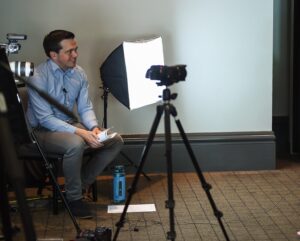Generation Z demands dialogue to drive change – but are we really listening?
About the author
Andy Morgan prepared this article as part of a CIPR Professional PR Diploma assignment while studying with PR Academy.

There’s an irony about ‘detox’ being a dirty word in the world of nutrition.

It’s the widely regarded consensus that if you’re going to ply your body with processed foods and high calorie snacks most of the time, then a week or two of nothing but something green from a blender is unlikely to make that big a difference.
So what are we to make of the latest part of people’s lives been be given the detox treatment? It’s the rise of the digital detox, a trend being led by the first group of genuine digital natives – Generation Z. It’s a generation that demands to be heard, but are we really listening?
At the end of the Netflix documentary, The Social Dilemma, the former employees of social media giants were asked if they allowed their children on social media. Spoiler alert: Most of them don’t.
Unsurprising, really, given these were the people who helped build the algorithms designed to draw attention to the point of addiction. And when have you ever known addiction to be associated with anything positive?
The implications of a bad diet are generally quite easy to spot, and data from the UK government shows that around one in three children are overweight or obese. The implications of an addiction to social media aren’t always in such plain sight.
Social media rewards people with stimuli – likes, notifications, comments to keeps them engaged with content.
When a user’s post is “liked”, the same dopamine pathways involved in motivation, reward, and addiction are activated. What keeps us hooked on social media isn’t just the “pleasure rush of the like,” says Sara Johansen, resident psychiatrist at Stanford and director of clinical innovation at Stanford Brainstorm, “it’s the intermittent absence of the like that keeps us engaged.” Perhaps more simply put, you can’t live with it, but you can’t live without it. Or to bring it up to date, it’s what Generation Z would refer to as FOMO – the fear of missing out.
There are almost 12.7 million people classed as Generation-Z in the UK today – that is those born between 1997 and 2012. This is the first generation to truly be digital natives and unsurprisingly they spend more time online than any other generation in the UK. Although in something of a decline, at the last count 88% of people aged 16-24 had a social media profile. Despite – or perhaps because of this – 77% of Generation Z would definitely do, or definitely consider, their very own digital detox, stepping away from their devices and disconnecting from social media. Maybe this is the sign that things aren’t quite right. Research by Origin Hill pointed to reasons behind leaving social media as depression, lower self-esteem and simply too much of a distraction. This is also a generation where 41% globally feel anxious or stressed, most or all of the time.
Spoiler alert number two: In The Social Dilemma, 2009 was pinpointed as a milestone year in which the incidences of self-harm and suicide among teen and pre-teen young people soared in America. The significance of that year was the increased access to social media on smartphones. So, do all roads lead back to social media?
Perhaps not, but algorithms mean that the road to social media is forever an enticing one. Algorithms are designed to drive attention because attention is the currency of advertisers. In the fourth quarter of 2021, Meta (formerly Facebook), revenue streams excluding advertising generated just $1032 million. Yes, ‘just’. Because advertising revenue accounted for $32 billion.
A House of Commons Science and Technology report in 2019 (Impact of social media and screen-use on young people’s health) deemed that social media was still “a relatively new phenomenon” and the impact of social media was a “young research field” so the links are still underdeveloped. Let’s not forget that this is also a generation whose formative years have been spent in the midst of a global pandemic.
Any talk of a real demise of social media among Generation-Z is not inevitable, or frankly, even close. Why? They are the generation who believe strongly in action on issues like race equality and particularly climate change, given they’re the generation both least responsible for it and most likely to suffer. We see the role of social media in creating a climate activist icon in Greta Thunberg, or #NeverAgain, an American student-led political action committee for gun control that advocates for tighter regulations to prevent gun violence. Much like the fast food industry hasn’t disappeared from our service stations or high streets with the rise in popularity of health foods, social media isn’t going anywhere, anytime soon. But that doesn’t mean we can carry on as we have been if we want social media to be a powerful tool for engaging with prospective customers or future employees.
‘Adapt or die’ is the well-worn line, and the biggest multi-national businesses were not likely to crumble with a rise in health foods. From more plant-based options on the menu to offering vegetables as part of ‘Happy Meals’, McDonalds has evolved with its customer base. However, McDonalds’ year-on-year revenue over the last ten years has shown a downward trend, but the famous arches are still very much golden if you’re a shareholder. McDonalds CEO, Chris Kempczinski, says that, “It’s not up to me to make those choices” when it comes to healthy eating. The plant-based foods and carrot sticks in Happy Meals are there because people buy them, as opposed to any great social conscience. Is that lack of authentic purpose a contributory factor to the downward trend in revenue?
In fact, some brands have already seen enough, doubtless in no small part to the lack of trust in social media.
Cosmetics brand Lush has an anti-social media policy, with Chief Digital Officer, Jake Constantine saying that social media is the “antithesis” of Lush’s aims to provide products that help people relax and switch off for the good of their wellbeing.
The boycott began at the end of 2021, but while Covid-19 has distorted our concept of time somewhat, you’re not mistaken in thinking that Lush did this longer ago than the last few months. In March 2019, they decided it didn’t want to battle with algorithms or pay to appear in people’s news feeds. You could say that it was a nine-month detox, but the impact of the pandemic forced their hand and they returned. And while their anti-social media policy is easy to find online, so is their very much still active Twitter profile, although it’s filled more with social causes than product promotions. Perhaps more proof that a detox is not sustainable.
Social media retains its power but this generation won’t stand for it solely powering profits. The #NeverAgain movement was participatory politics, but that suggests it’s not something businesses should want to get involved with. So, let’s reframe it. It’s about purpose. Generation-Z expect your organisation to have a purpose, and they expect it to be more than just lip service. You need to back up your words with actions. But before we act, we must listen.
‘Beyond Binary – the lives and choices of Generation Z’ report by Ipsos Mori tells us that compared to their predecessors, there is a shift towards interactive communication rather than straight consumption. Essentially, Generation Z don’t want to be talked at, they believe in dialogue as a means to changing the system, not breaking it by force. Dialogue does not emphasise talking, but instead a form of discourse that emphasizes listening and inquiry, with the aims of fostering mutual respect and understanding.
Jim Macnamara, Professor of Public Communication at the University of Technology Sydney, conducted a large international study involving government, corporate, non-government and not-for-profit organisations, summarising that on the whole, listening is not a strong point. We cannot continue to operate on transmit, pushing out messages and expecting this to create strong relationships with Generation Z. The McDonalds example could be a prime example of hearing, and not really listening. Regarding listening as some form of digital surveillance as opposed to insight that drives the genuine change Generation Z demand.
Organisational listening brings many advantages to organisations: it strengthens relationships, improves customer satisfaction and helps us to have a better understanding of how we’re being spoken about online. Research tells us that Generation Z consider that currently, brand presence on social media is for the benefit of the brands, and are only moderately interested in their opinions, questions and experiences. Those who listen better are trusted more – it’s there in black and white.
For years, we have considered social media as an opportunity to get our messages out to people, and these people will in turn tell more people. Engagements increase and profits follow suit. But at what price? Quite clearly, it is at the price of trust, and that is not a source of income that we should treat as readily disposable. Trust is hard earned and quickly lost. Currently, organisations are far more trusted than governments and it is a position of strength we should build on as opposed to taking for granted.
The technology is there to support effective listening and social media gives voices to more people than ever before. Social media as a whole has its own trust problem, but the numbers of Generation Z continuing to use it show it still plays a prominent role in their lifestyle. Generation Z don’t want to see people sitting on the side lines. We must get onto the pitch and change the game ourselves.
The example of Lush is not one that many others have followed. But their reasons align with who they are and what they stand for as a brand. That’s the sort of authenticity that breeds trust and trust is good for business and essential for society. Authenticity is essential – Generation Z want brands that align with their beliefs and values, not purpose washing.
As leaders, we must create a culture of listening and put the pieces in place to make it happen, through human resource or technology. We’ve never had more voices to listen to, which can feel daunting and overwhelming. But what is the alternative? We continue as we are and the distrust that surrounds governments and media engulfs organisations, too? Then what is left? By actively listening, the insight it will bring can yield positive results long term.
Be they current or prospective customers or employees, Generation Z know the diet they want from social media. They want their voices heard, and we must play our role in facilitating this. The rise of the digital detox shows that they don’t want more of the same. They are telling us that loud and clear, and we simply must listen.